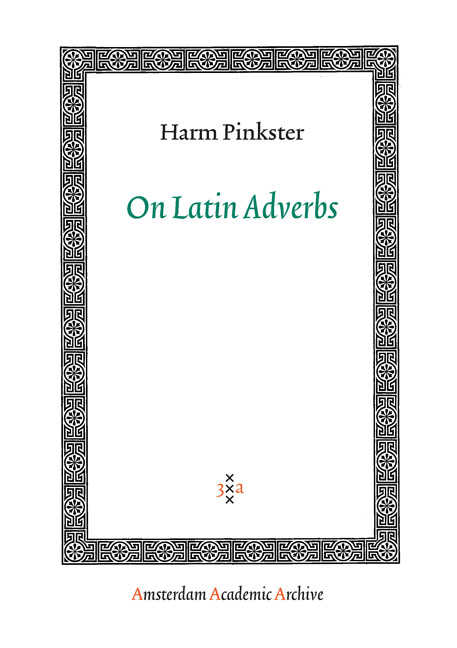Book contents
- Frontmatter
- Preface to this Edition
- Preface
- Contents
- Introduction
- 1 General Problems of Studying a Dead Language
- 2 Problems of Classification
- 3 Adverbs in Roman Grammatical Theory
- 4 The Adverb in Latin Linguistics
- 5 Adverbs as Derived Forms
- 6 Syntactic Problems
- 7 Subclassification of Adverbs
- 8 Adverbs and other Invariables
- 9 The Relationship Between Adverbs and Prepositions
- 10 Adverbs and Connectors
- 11 Adverbs and Subordinators
- Bibliography
- Indices
- Index Auctorum
- Titles Published in the Aaa Series
1 - General Problems of Studying a Dead Language
Published online by Cambridge University Press: 24 January 2021
- Frontmatter
- Preface to this Edition
- Preface
- Contents
- Introduction
- 1 General Problems of Studying a Dead Language
- 2 Problems of Classification
- 3 Adverbs in Roman Grammatical Theory
- 4 The Adverb in Latin Linguistics
- 5 Adverbs as Derived Forms
- 6 Syntactic Problems
- 7 Subclassification of Adverbs
- 8 Adverbs and other Invariables
- 9 The Relationship Between Adverbs and Prepositions
- 10 Adverbs and Connectors
- 11 Adverbs and Subordinators
- Bibliography
- Indices
- Index Auctorum
- Titles Published in the Aaa Series
Summary
In this chapter I will discuss a number of problems that are inherent in the study of a dead language. Next, I will expound what consequences these general problems have for the choice of the material. Finally, I will justify the use of linguistic universals in studying Latin adverbs after a brief exposition of the nature of this concept.
Problems o/the use o/a closed corpus
Some of the most important problems one has to face when undertaking a syntactic study of some aspect of the Latin language result from the fact that Latin is a dead language. The lack of native speakers as well as the fact that the corpus that has come down to us is almost definitely closed gives rise to certain difficulties, mainly of three types: (i) concerning productivity; (il) concerning grammaticality; (ill) concerning the adequateness of the corpus as to variety of constructions. These factors are complicated further by the uncertainty of the manuscript tradition.
Productivity
It is impossible to decide which of the utterances we find exemplify productive formation types and which do not. Some of them may agree with rules that were productive in former stages of the language, others with rules that possibly had not yet come fully into use. A decision could be reached by comparing stages of the language - assuming that the construction underlying the problematic utterance is attested in other stages - and’ by distinguishing different social strata. There is, of course, a large number of comparative studies, but most of them take the total system insufficiently into account and concentrate on details. The investigation of different social strata is difficult on account of the lack of material and has been carried out mainly from an aprioristic psycholinguistic point of view. Cf. Happ (1967: 64-78) on Hofmann (1963).
Since a division into productive and unproductive constructions is difficult, it is hard to decide which constructions should be descrIbed in the grammar and which should be referred to the lexicon as being idioms (De Groot 1956b: 22-4).
The problem of productivity is furthermore connected with the problem of grammaticality, which will be discussed shortly.
- Type
- Chapter
- Information
- On Latin Adverbs , pp. 9 - 16Publisher: Amsterdam University PressPrint publication year: 2005



